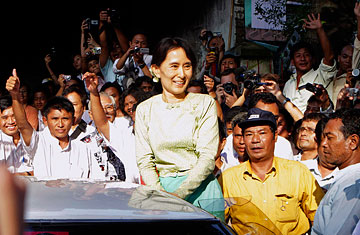
Burma's opposition leader Aung San Suu Kyi smiles to her supporters as she leaves the Rangoon headquarters of her National League for Democracy party on Nov. 15, 2010
Three days after her release from more than seven years of house arrest, the political future of Aung San Suu Kyi and her National League for Democracy (NLD) remained uncertain as her lawyers prepared to seek legality for the party and dialogue with the remainder of Burma's heavily fractured political landscape.
The democracy icon said on Monday afternoon she had still not held talks with any of Burma's other 30-plus political parties, including the National Democratic Force, a group that splintered from her NLD to run in the widely criticized Nov. 7 elections, the country's first in 20 years. "It's for them to decide first ... They have to decide whether or not they wish to work together with us or if they should have anything to do with us at all," Suu Kyi said on Monday at her party headquarters in Rangoon.
Many parties will likely be cautious of overly antagonizing the junta by forming bonds with Suu Kyi's party as the NLD is still technically illegal after choosing to boycott this month's election. NLD lawyer Nyan Win said the party will start to fight for its legitimacy this Thursday when the Burmese High Court in Naypyidaw is scheduled to hold a hearing on an appeal from Suu Kyi arguing that the NLD's dissolution is illegal.
On Nov. 12, the day crowds first started to appear outside Suu Kyi's house in Rangoon expecting her release, the junta mouthpiece The New Light of Myanmar appeared to offer the NLD some way back into the legal fold, albeit in a typically circumspect manner. The daily said political parties wishing to become legal should submit their credentials to the country's election commission, which would "scrutinize whether they are in conformity with the provisions prescribed in the law or not, and [a] decision will be taken."
The junta has made no other comments relating to the legality of the NLD since Suu Kyi's release on Nov. 13, nor has it tried to prevent people from visiting the party's headquarters in Rangoon, although government informants were out in force yesterday opposite the front gate. Inside, NLD members — some young but most of them old — gathered throughout the morning to witness the latest appearance by Suu Kyi, still a novelty after so many years of detention. The scene was much more low-key than Suu Kyi's packed rally the day before, when the inside of the party's headquarters heaved with people struggling to get a glimpse of the Lady.
What Suu Kyi will do next is a matter of much speculation. On Monday, she said she had much work to do in Rangoon before considering travel to other parts of Burma. In the past the junta has tried to prevent her from traveling outside the country's largest city and former capital in a bid to contain her support geographically, away from the provinces and the many ethnic groups that fringe the country, some of which continue to oppose the military through local militias.
Whether Suu Kyi is successful in someday fulfilling her long-standing goal of building democracy in this divided country will depend as much on gaining support among those warring ethnic factions as it will reconciling her own differences with the military regime. The democracy icon said again on Monday that she wishes to hold substantive dialogue with the junta. This would be unprecedented as previous talks had only happened when she was in captivity, and then only on a handful of occasions. "When I'm not under arrest I do not usually work with them," Suu Kyi said. "This is one of the problems, of course, the lack of communication."
